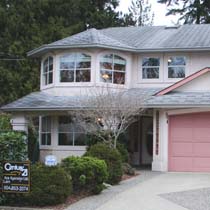Benchmark prices for all property types have dipped 2.1 per cent
Derrick Penner
Sun

House for sale in the Marpole area of Vancouver in April of this year. Vancouver Sun files
Month-over-month declines in real estate prices across many Lower Mainland property markets are another sign the overall market cycle has run its course, according to one housing economist.
The so-called benchmark price for all property types tracked in Metro Vancouver, excluding Surrey, have dipped 2.1 per cent since May to hit $556,605 at the end of July, the Real Estate Board of Greater Vancouver reported Tuesday.
In the Fraser Valley markets, which include Surrey, there were also month-to-month drops in prices in July with the biggest decline in average single-family-home price. The average Surrey house price of $520,232 was down six per cent from the month before.
Cameron Muir, chief economist for the B.C. Real Estate Association, said he doesn’t believe that there was a housing bubble that has now burst, but said there has been a change in the cycle.
“Typically at the end of a market cycle you will see home prices remain flat, or even come off a few percentage points a year, until the next cycle begins,” Muir said in an interview.
“That’s what we’re looking at right now,” he added, but “barring a complete deterioration in the provincial economy and mortgage interest rates climbing rapidly, that’s kind of what we see in terms of what market activity is showing us.”
The Vancouver board reported 2,174 property sales in July, a 44-per-cent decline from the same month in 2007. July listings, meanwhile, increased 24 per cent to 6,104 compared with the same month a year ago.
Total active listings in the inventory, however, were down slightly from June, the board said, at just over 19,000 compared with just over 20,000 the month before.
“We’re seeing more price reductions in properties listed on the market, which is a levelling impact on the housing-price increases experienced at the end of last year and into the first quarter of 2008,” Dave Watt, president of the Real Estate Board of Greater Vancouver, said in a news release.
The board said the dip in prices was felt across property types.
The typical detached home price has declined 2.3 per cent, the typical townhouse one per cent and the typical condominium one per cent since the end of May.
The dip, however, hasn’t taken out all of the gains that property owners have seen over the last year. Board statistics show that the typical detached home price, of $753,165 is still 5.4 per cent higher compared with the same month a year ago.
The typical townhouse price in July of $473,953 was 5.7-per-cent higher than July 2007. And the typical condominium price of $381,687 in July was still 4.7 per cent higher than in the same month a year ago. Sales across the Fraser Valley in July were down 35 per cent to 1,284 compared with the same month a year ago and new listings rose 20 per cent to 3,742 compared with July 2007, bringing the region to a record high inventory of 12,299 units.
“It’s a situation of supply and demand,” Kelvin Neufeld, president of the Fraser Valley Real Estate Board, said in a news release. “Buyers are now in the driver’s seat in the Fraser Valley and we’re starting to see that reflected in home prices.”
The average price of a detached home across the Fraser Valley was $530,455 in July, which was down 5.6 per cent compared with June but still two per cent above the July 2007 average sale price.
In townhouses, the average Fraser Valley price in July of $324,042 was 3.9 per cent less than the June average, but 0.2- per-cent higher than in the same month a year ago.
In Fraser Valley condominium prices, the July average price of $234,597 was 1.1 per cent below June, but remains 6.5 per cent higher than in the same month a year ago.
Muir said several factors are crimping the demand side of housing markets. The prices have become less affordable for too many who want to get into the market, the economy has slowed in areas such as forestry and tourism, and consumer confidence is down in the face of high fuel prices, the spectre of rising food prices and bad news coming out of the growing housing recession in the United States.
“There’s not a lot of economic news out there right now that is going to bolster demand in a significant way that we’ll see sales levels return to what they were,” Muir added.
© The Vancouver Sun 2008

